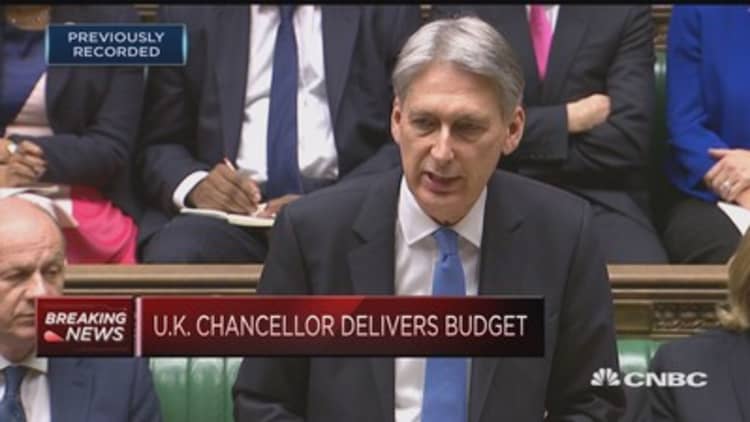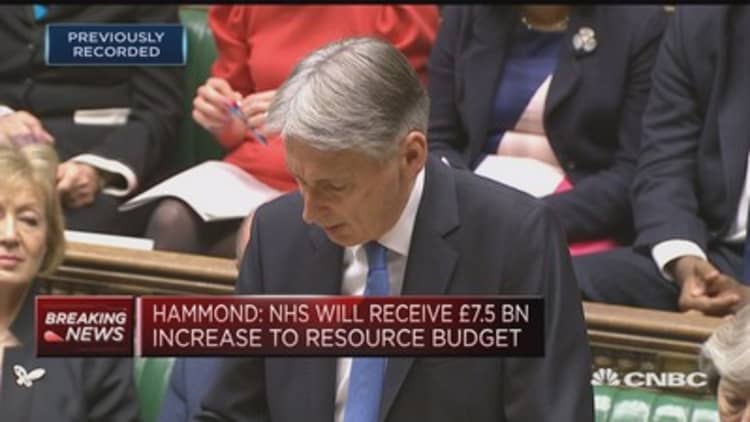
Britain slashed its official projections for economic growth Wednesday and anticipates it will need to borrow sharply over the coming years.
Finance Minister Philip Hammond delivered the U.K. government's official Autumn Budget at a time when the ruling Conservative party is facing challenging political and economic circumstances.
The non-partisan Office for Budget Responsibility (OBR) forecast Britain's gross domestic product (GDP) would grow by 1.5 percent in 2017 before slipping gradually to 1.3 percent over the next three years. The U.K. had been forecast to grow by 2 percent in 2017.
The OBR also revised down productivity growth and business investment. Britain's changing economic condition has stirred fierce debate over how much should be attributable to the uncertainty surrounding Brexit.
Hammond promised to set aside £3 billion ($3.9 billion) over the next two years for Brexit contingency planning.
"The negotiations on our future relationship with the European Union are in a critical phase," Hammond said.
"We have already invested almost £700 million in Brexit preparations and today I am setting aside over the next two years another £3 billion," he added.
Britain's finance minister had been facing mounting pressure ahead of the budget speech, with lawmakers from all sides urging him to increase spending amid austerity fatigue from the British electorate.
Budget deficit
The OBR — an organization that is a non-departmental public body that gives estimates to the finance ministry — said inflation would fall towards 2 percent later this year, from a peak of 3 percent.
The group said annual borrowing would be around £49.9 billion in 2017, more than £8 billion lower than forecast in March.
On debt, the OBR said it would peak at 86.5 percent of GDP this year, before falling over subsequent years to 79.1 percent by 2023.
"We understand the frustration of families where real incomes are under pressure," Hammond said, as he welcomed the OBR's forecast of debt as a share of GDP falling over the coming years.
On Tuesday, figures from the Office of National Statistics (ONS) showed Britain's deficit rose to £8 billion last month — a rise of nearly 7 percent when compared to the same period a year earlier. Analysts had anticipated a figure of around £7 billion.
The widening budget deficit, which is the gap between government spending and tax receipts, pointed to a weaker picture than previously thought for the U.K.'s public finances.

Hammond has pledged to achieve a budget deficit of less than 2 percent of GDP, from 2.6 percent for 2016/17, by 2020 with the goal of eliminating the deficit by the mid-2020s. Before the Brexit vote in 2016, the U.K. had been hoping to post a budget surplus by the end of this decade.
Britain's FTSE 100 rose 0.5 percent as Hammond delivered the Autumn Statement, while sterling dipped to a session low of 1.3213 against the dollar.
Housing
Hammond pledged to build 300,000 new homes per year by the mid-2020s on Wednesday and said the ruling party would address inefficiencies in the property market. He said including loan guarantees £44 billion would be made available in government support to boost construction skills.
House affordability has been a hot topic of debate on both sides of the political spectrum and Prime Minister Theresa May wanted to make it front and center of this budget given that youth home ownership has been on the decline since the Conservatives came into government.
Hammond also said:
- Tax-free personal allowance would increase to £11,850 in April 2018
- Higher-rate 40 percent tax threshold to start at £46,350
- Stamp duty abolished for first-time buyers purchasing homes worth up to £300,000
- People buying homes worth up to £500,000 will have no stamp duty on first £300,000
- Investment of £20 billion of new investment in U.K. technology industries
- £540 million to invest in growth of electric vehicles
- £500 million to be invested in 5G mobile networks, artificial intelligence and fiber broadband
- Tobacco duty to rise by 2 percent above Retail Price Index (RPI) inflation
- Duty on wine, spirits, beer and most ciders to be frozen.
— CNBC's Joumanna Bercetche contributed to this report.


